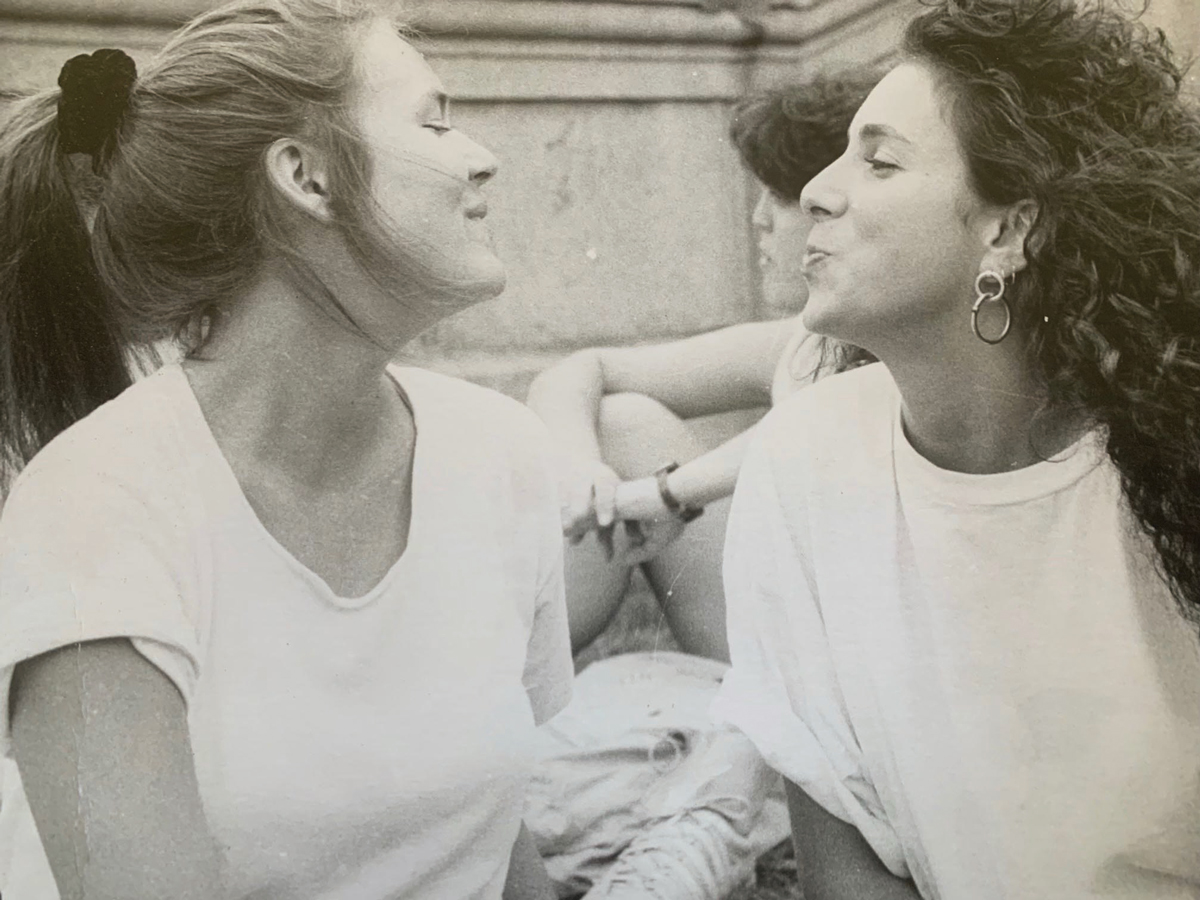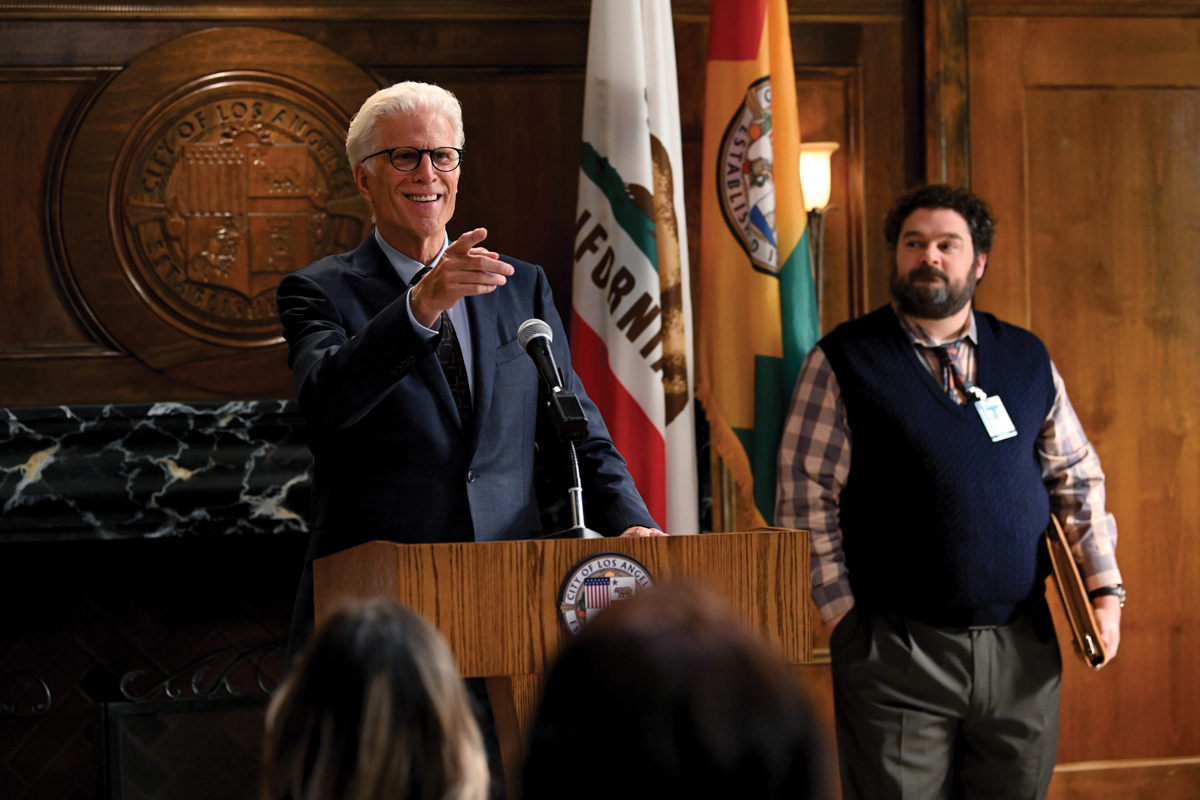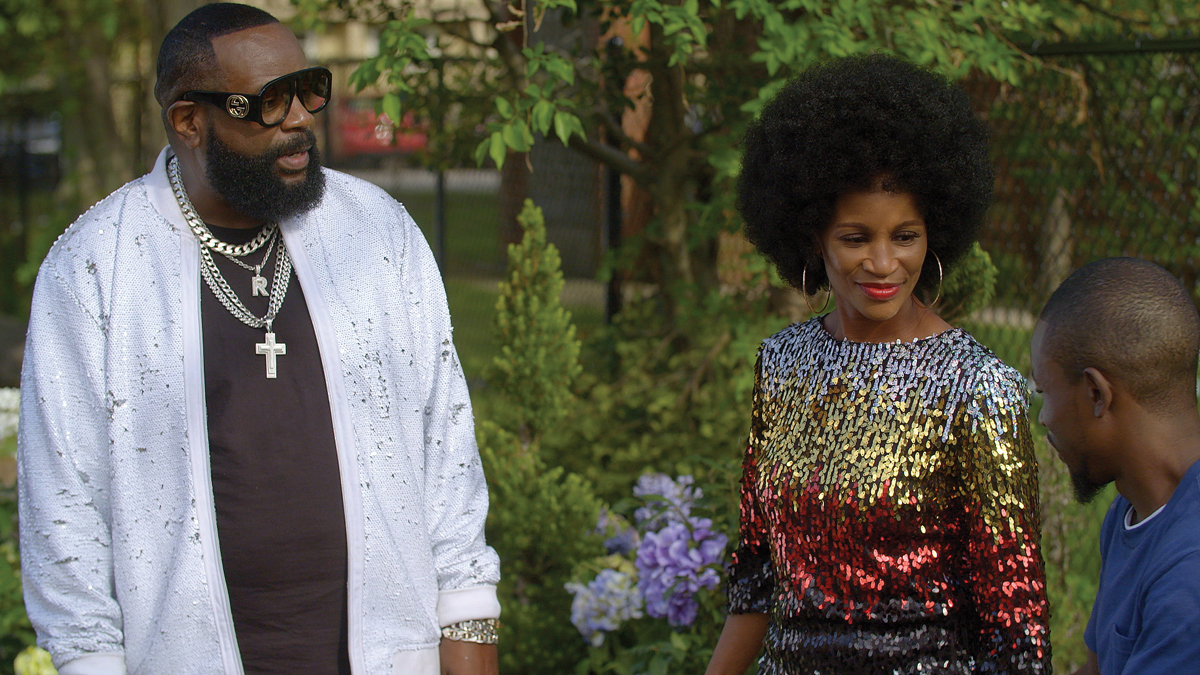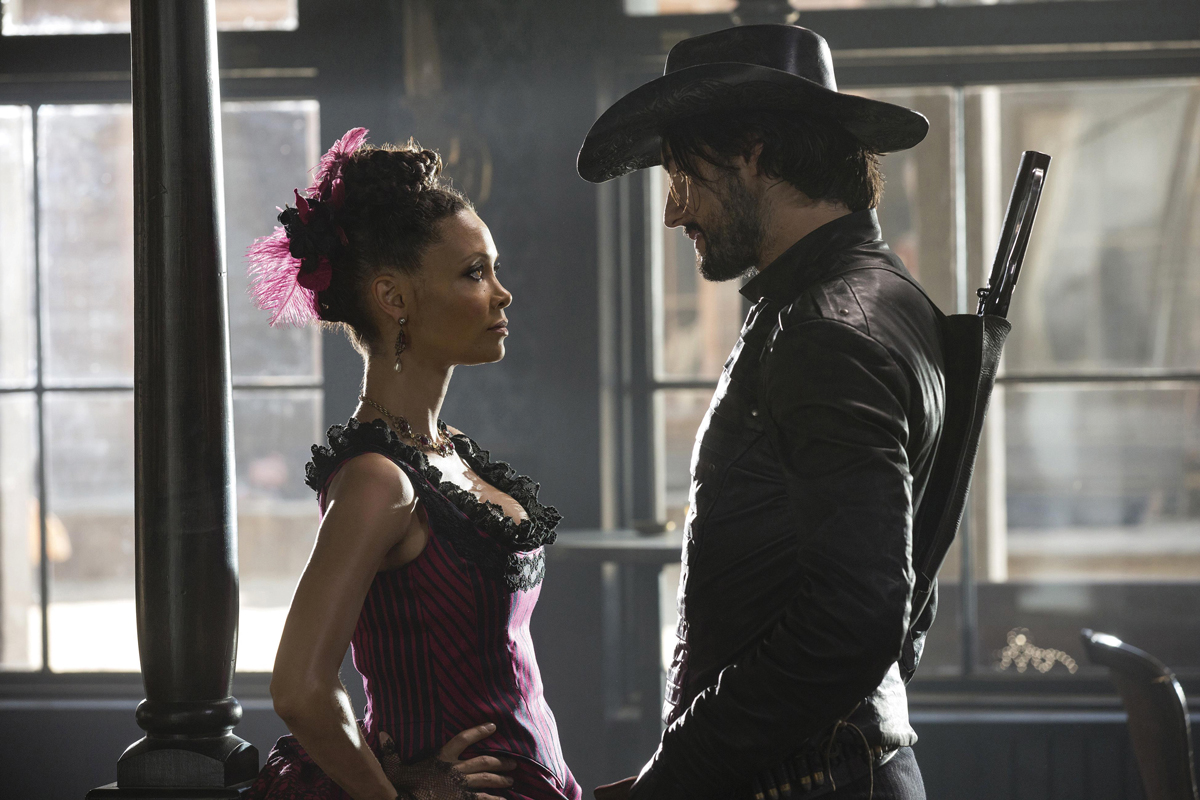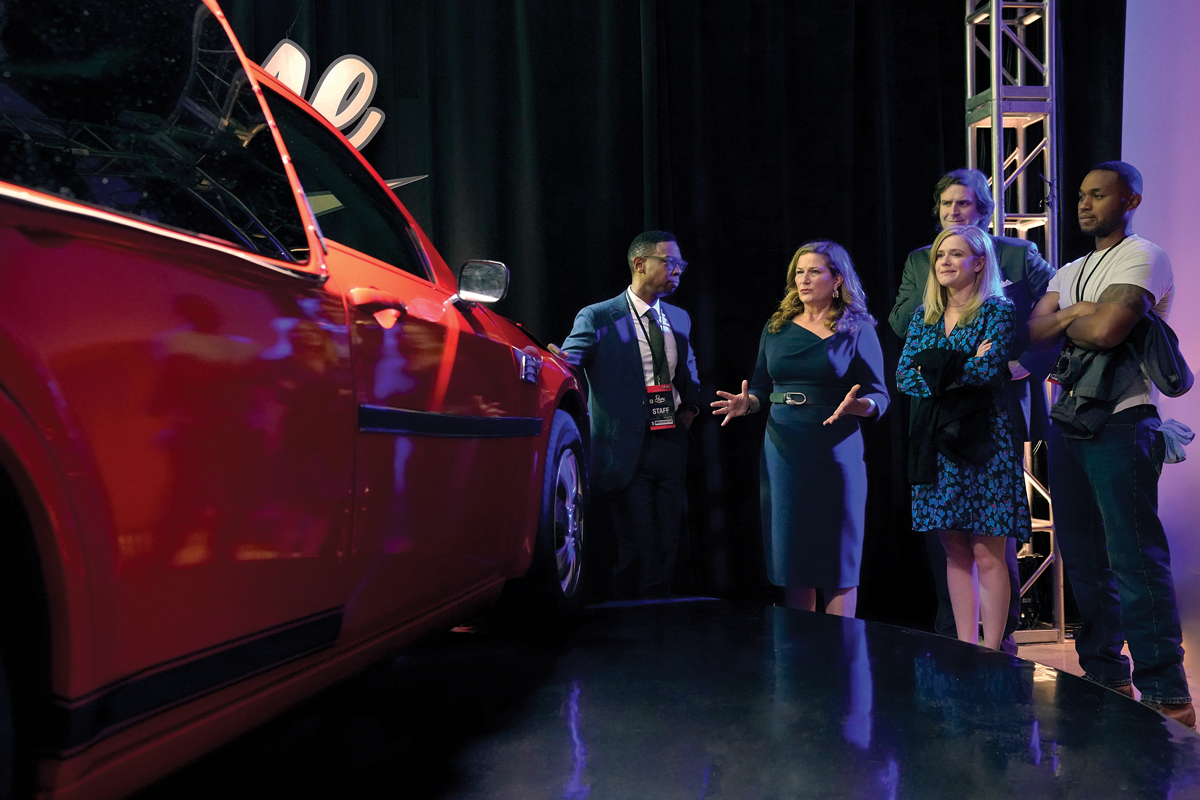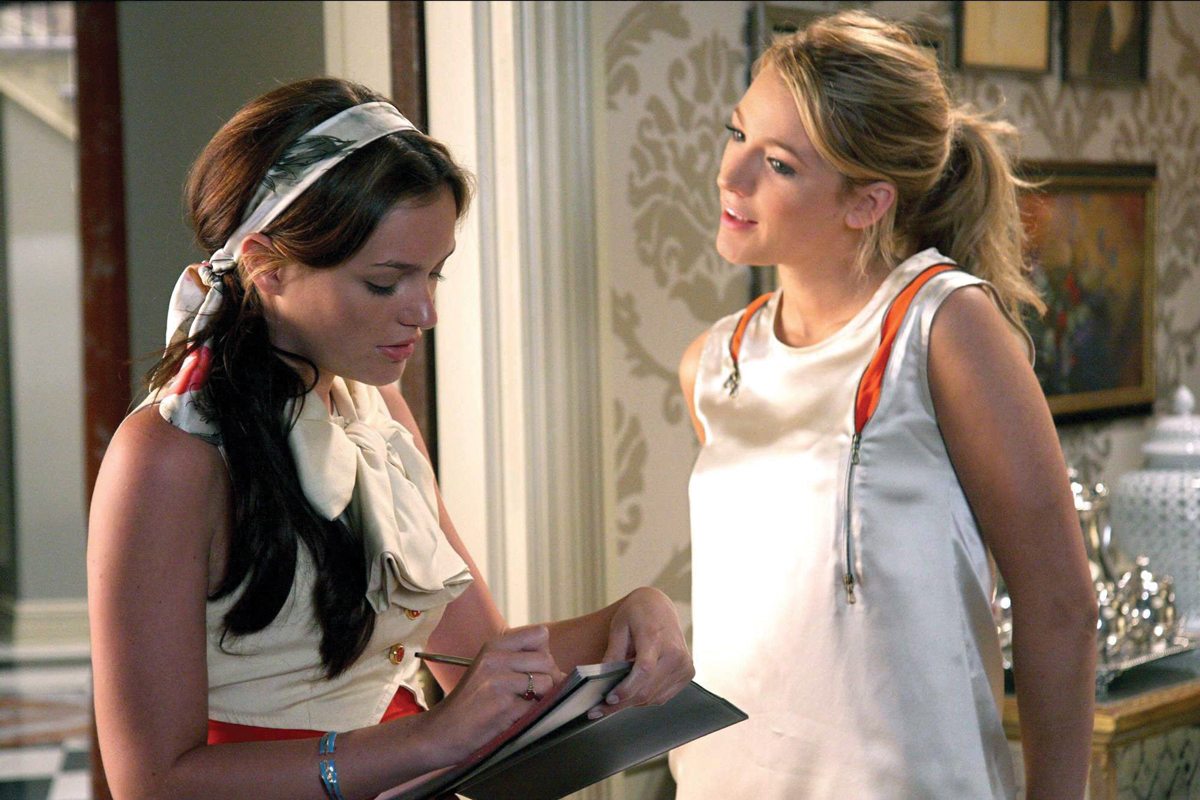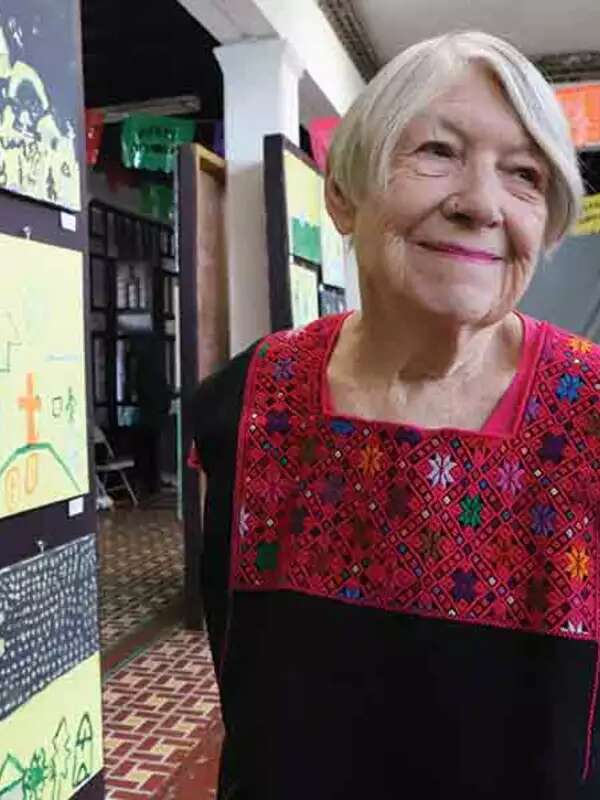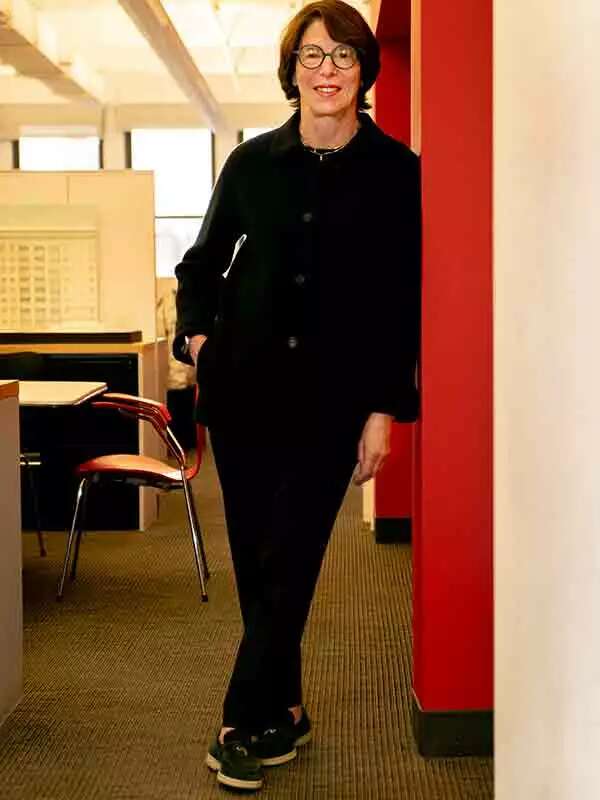
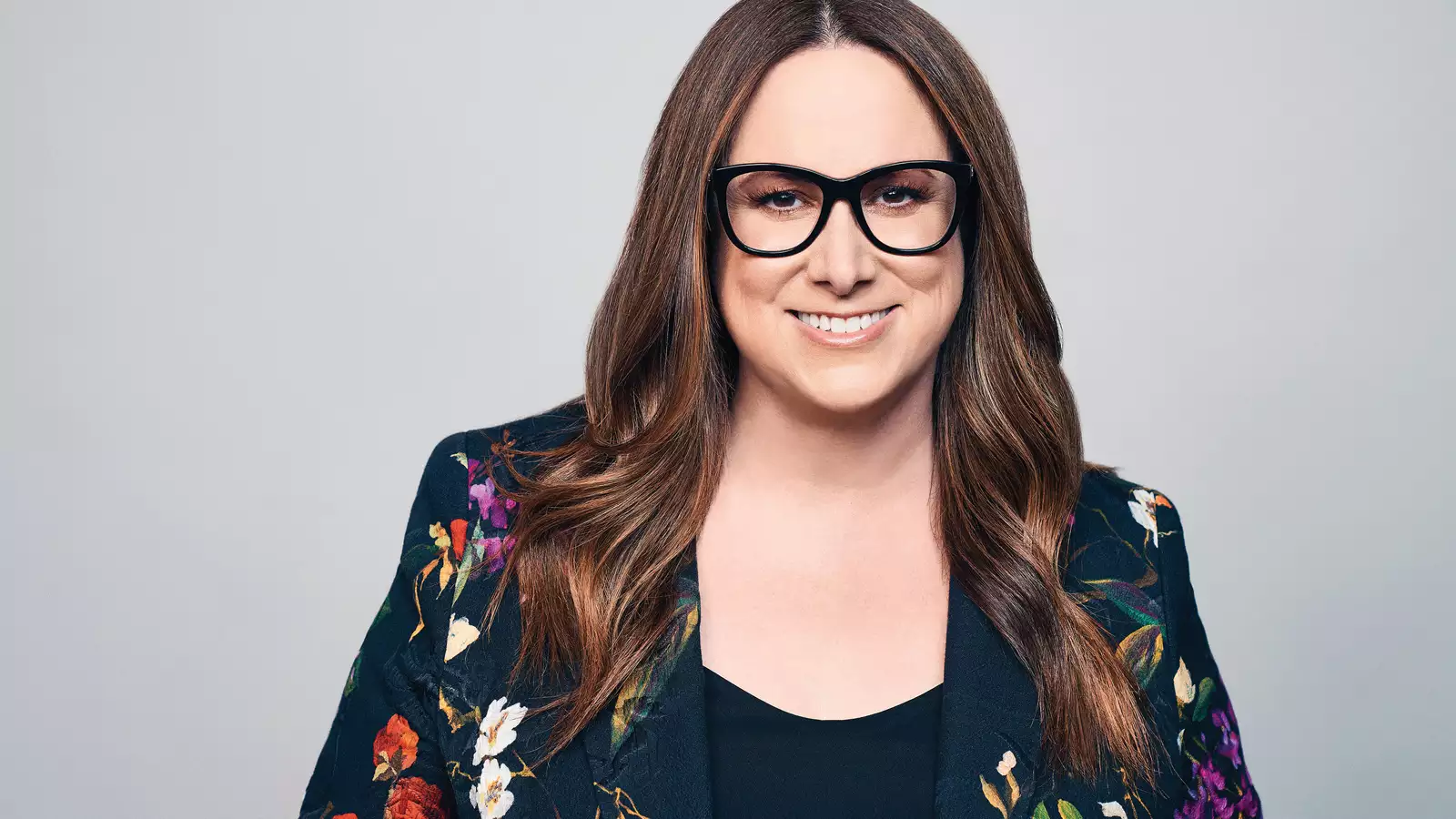
Susan Rovner ’91, P’23 can’t recall a day when she didn’t love television. As a kid growing up on Long Island in the late ’70s, she would scramble downstairs, flick on the tube, and sit transfixed by spine-tingling episodes of The Twilight Zone or giggle along to the slapstick antics of Larry, Moe, and Curly in the Three Stooges shorts. As family lore has it, her mother once encountered a young Rovner draped over the television set completely asleep. When she asked what her daughter was doing, a bleary-eyed Rovner reportedly replied, “I wanted to be on TV.”
Rovner may never have starred in a TV show herself, but her work has very likely been beamed into your home: Gossip Girl, Everwood, Westworld, One Tree Hill, You, 2 Broke Girls, and Cold Case — to name just a few — are all projects she has shepherded in her two decades as one of the most respected names in the business, most recently as president of Warner Bros. Television (WBTV).
Last fall, she landed her most ambitious role to date, as chairman of entertainment content for NBCUniversal Television and Streaming, a title that puts her at the creative helm of an empire that includes seven television networks — NBC, Bravo, E!, Oxygen, Syfy, Universal Kids, and USA — and the network’s year-old streaming service, Peacock. For Rovner, the promotion is a capstone to a career defined by hard work and an ardent love of the medium.
“I approach everything that I do in television as a fan, not a critic,” she says. “[My shows have] really run the gamut, but I loved them all so equally. I think my approach to all of it was, ‘How do I help make this show the best it can be?’”
Rovner’s on the phone from California, where she lives with her mom, husband, and three kids (two are college-aged and attend Barnard and Columbia; the youngest is still in high school). Rovner joins NBCUniversal at a critical moment in television history, one that in the past year saw production grind to a halt and advertising dollars plummet during the COVID-19 pandemic. There are broader existential questions too, especially as streaming ventures continue to gobble up traditional television audiences, and Hollywood faces a reckoning over racial and gender inequality, encapsulated by hashtags like #MeToo and #OscarsSoWhite.
Rovner’s new role places her squarely at the center of some of these issues, but her colleagues and collaborators point to her ability to thrive in what can be, at times, a turbulent and toxic industry. As Greg Berlanti, the Golden Globe-nominated writer, director, and producer behind series like Dawson’s Creek, Everwood, and You, puts it, “Television has been forever changing. [Susan’s] been a real constant.”
As a child and young adult, however, Rovner didn’t know that a career in television was a possibility. She grew up in a lower-middle-class household just outside of New York City (“My full name is Susan Rosner Rovner and I’m from Roslyn, Long Island,” she quips); not working was never an option. “I think my work ethic and so much of what defines me is because I’ve just always had to,” she says.
So when she enrolled at Barnard in 1987 as a math major, television was nowhere on her radar. “I knew that I wanted to be in an environment that would let me find my voice, that would let me speak,” she recalls. Rovner switched to a political economics major her junior year, while working waitress and retail jobs to support herself. After graduating in 1991, she intended to go work for the Federal Reserve Bank, but Rovner remembers, “I had this moment of truly freaking out and being like, ‘Do I want to do this for the rest of my life? I don’t think I do.’”
She decided to take a leap of faith and move to Los Angeles, giving herself three months to find a job. If she couldn’t, Rovner reasoned, she would simply move back to New York. “I wish I could say there was a direct plan — there wasn’t,” she laughs.
[Susan] prioritizes the storytelling, and she has her pulse on how to work with artists in a way that allows them to expand their imagination.
Once in L.A., Rovner made a friend who happened to work at the Fox Broadcasting Company. Rovner’s mind was blown. “I was like, ‘Oh, my God. This is amazing. You do this?’” she recalls. “I didn’t leave her alone until she helped me find a job.” The friend came through. Rovner secured an interview for a personal assistant job on the movie side of an agency called Triad Artists. “I gave the interview of my life,” Rovner says. Though she had zero Hollywood experience under her belt, Rovner’s business acumen and math background impressed her would-be boss, and she landed the job. It was far from glamorous, filled with typical PA tasks like picking up the phone, making photocopies, and running errands, but a whole new world was opening up to her, and she was getting exposure to big-name writers and producers. She was hungry for more.
Rovner spent a total of two years in the agency world before moving to a production company that made TV movies in 1994. “It was sort of production boot camp because it was very small and we did everything,” she explains. By the mid-’90s, Rovner was moving up, in both her career and her life. She was offered a job at ABC in 1996 to work on movies for television. The following year, she married her husband, Robert Rovner, a television writer and producer also from the New York area (they met on a blind date in Los Angeles). Disney acquired ABC, and Rovner — by then the executive director of her department — felt she needed a change. In 1998, an opportunity came up to be the director of drama development at WBTV. It was a step back, in terms of both title and pay, but something told Rovner it was the right move. “I was terrified,” she says, “[but] my heart told me to take the job, and it was the best thing I ever did.”
Rovner thrived at WBTV. Throughout the early-to-mid 2000s, she worked with writers and producers on shows like The O.C., Cold Case, and Everwood and collaborated with noted producers and directors, including J.J. Abrams and Jerry Bruckheimer. Still, being a woman in Hollywood was no cakewalk. “You know, it was really, really hard,” Rovner says of those early years. “There was a ton of sexism. There was also very much a belief that you could not be both a mother and an executive. And I really didn’t have a ton of women that I was close to ahead of me to look at who had done it.”
A women’s conference at Time Warner (WBTV’s parent company) in 2010 marked a turning point. There, Rovner learned about something called “the Tiara Syndrome,” a phrase coined to describe a woman’s tendency to work hard hoping to be “crowned” with a raise or a promotion. “Unfortunately, that’s not how the world works,” Rovner says. “I loved it [at Warner Bros.], but I was stuck. And all these men around me were getting promoted,” she continues. “I was like, ‘Oh my God, I’ve got to tell them what I want. I’ve got to demand it.’”
Post-epiphany, Rovner took charge of her destiny. In 2010, after eight years as senior vice president of drama development for WBTV, she was named the executive vice president of development. Four years later, she added co-president of Warner Horizon Scripted Television to that title. And in 2019, after more than two decades at the company, she was elevated to joint president, a role that included overseeing scripted series across the five major American broadcast networks (NBC, CBS, ABC, Fox, and the CW Television Network) and streaming platforms, including Apple TV+, Netflix, and Hulu.
Advocating for herself may have been a new concept for Rovner, but her collaborators also point to her unwavering advocacy for people and ideas she believes in. Writer and producer Roberto Aguirre-Sacasa recalls struggling to get a movie based on the Archie comic books off the ground. After fits and starts, he wound up pitching it to Rovner at WBTV as a television series. “I walked into her office, and before I even said what I was there for, she said, ‘I love your writing, I love the Archie comic-book characters. We’re going to make the show, and it’s going to be a monster hit,’” Aguirre-Sacasa remembers.
That meeting set the series Riverdale into motion, which, after airing on the CW, became one of Netflix’s most popular series worldwide. Says Aguirre-Sacasa, “Susan saw Riverdale before anyone else did — meaning she saw the potential in the idea.”
Berlanti, the writer-producer, says Rovner encouraged diverse voices before “inclusivity” became a Hollywood catchphrase. “Ten, 15, 20 years ago … it was still pretty much a given that most stories would be from a straight, white, cisgendered male point of view,” he says. “And the reason that this [more diverse] kind of storytelling became so ascendant is because of executives like Susan.”
Ava DuVernay, the Academy Award-nominated director, writer, and producer, has worked on numerous projects with Rovner over the years, notably on the critically acclaimed series Queen Sugar. DuVernay describes the experience as a “nourishing” one, in part because Rovner gave her complete creative latitude. “She prioritizes the storytelling, and she has her pulse on how to work with artists in a way that allows them to expand their imagination,” DuVernay says. “And when artists expand their imagination, they’re able to come up with ideas that feel fresh and execute them in ways that they would want to see. She plants those seeds.”
Indeed, nurturing a positive corporate culture is the first thing on Rovner’s to-do list (a paper list she literally keeps in her home office) while at NBCUniversal. She wants to create an environment in which “there’s collaboration, that we can treat each other with mutual respect that we embrace different points of view, and that we’re inclusive and have a diverse body [of employees],” she says. Rovner is also looking to grow and define the content strategy for Peacock, the streaming service that NBCUniversal launched last July (there are also premium, paid-subscription tiers). Even as she grows Peacock, she hopes to keep the company’s traditional TV channels (known as linear networks), such as NBC and USA, healthy by continuing to serve their audiences and seeking out compelling programming.
The challenges are formidable — How do you get a fan of Bravo’s The Real Housewives of Atlanta, say, to sign up for Peacock? — but Rovner is excited to reveal more about her game plan in the coming months. Already under her tenure, the company has announced it’s ordered The Best Man: The Final Chapters, a spinoff series based on Malcolm D. Lee’s 1999 rom-com, to stream on Peacock, and La Brea, a drama about a sinkhole upending a family of Angelenos, for NBC this fall.
Which brings her to the final item on her list: to win. “It’s sort of a joke, but not,” she says. “I want to have the best shows, I want to have shows that resonate with our audience, I want to get great ratings, and I want to make a lot of money for the company.”
As Rovner makes good on that plan — between countless video calls, making sure her kids are set for their remote school days, and walks through the neighborhood — she still remains a fervent television fanatic, one who thinks that Sex and the City represents perfect television and has even been known to incorporate Barnard into the plotline of Riverdale.
“She’s not just a great executive, she’s a great mom and a great wife and really is doing it all,” Berlanti reflects. “Supergirl is one of our shows together, and, you know, it’s very true of her."
